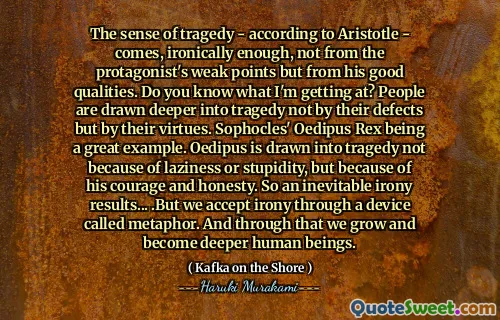Not just beautiful, though - the stars are like the trees in the forest, alive and breathing. And they're watching me. What I've up till now, what I'm going to do - they know it all. Nothing gets past their watchful eyes. As I sit there under the shining night sky, again a violent fear takes hold of me. My heart's pounding a mile a minute, and I can barely breathe. All these millions of stars looking down on me, and I've never given them more than a passing thought before. Not just the stars - how many other things haven't I noticed in the world, things I know nothing about?
In Haruki Murakami's "Kafka on the Shore," the protagonist reflects on the stars, likening them to living entities akin to trees in a forest. This realization brings an overwhelming sense of awareness and fear, as the protagonist feels the stars are cognizant of his past and future. This connection evokes a deep sense of vulnerability, highlighting the idea that the universe is always observing. The beauty of the stars contrasts with the protagonist's unsettling realization that so much around him has gone unnoticed.
The moment under the night sky serves as a catalyst for self-reflection, prompting thoughts on the broader aspects of life that often remain overlooked. This existential anxiety illustrates how easily one can feel insignificant in the vastness of the universe. It pushes the protagonist to reconsider the myriad elements of the world he has ignored, emphasizing a longing for deeper understanding and connection to life itself.






